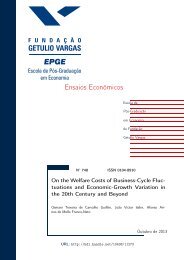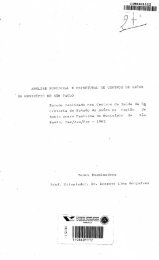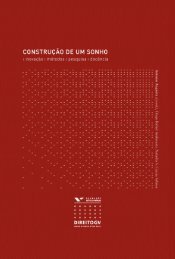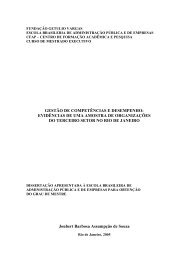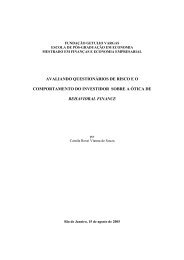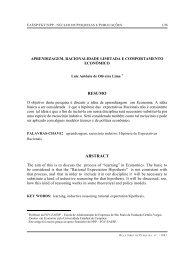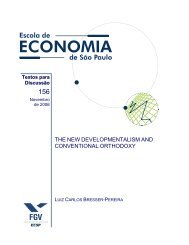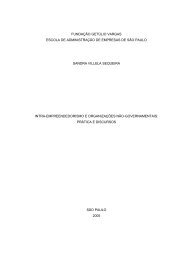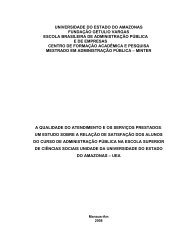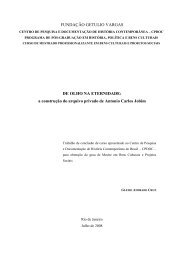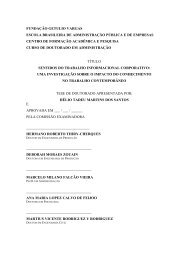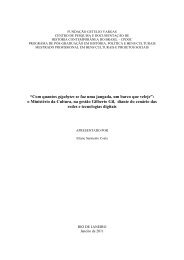t - Sistema de Bibliotecas da FGV - Fundação Getulio Vargas
t - Sistema de Bibliotecas da FGV - Fundação Getulio Vargas
t - Sistema de Bibliotecas da FGV - Fundação Getulio Vargas
You also want an ePaper? Increase the reach of your titles
YUMPU automatically turns print PDFs into web optimized ePapers that Google loves.
problemas no uso <strong>da</strong> função. O primeiro problema encontrado foi o <strong>de</strong> <strong>de</strong>terminação<br />
simultânea <strong>da</strong>s variáveis capital e trabalho, toma<strong>da</strong>s como exógenas e<br />
in<strong>de</strong>pen<strong>de</strong>ntes.<br />
Um dos artigos mais citados nessa linha crítica é o <strong>de</strong> MARSCHAK e ANDREWS<br />
(1944). Na introdução <strong>de</strong> seu trabalho eles <strong>de</strong>ixam bem claro seu ponto <strong>de</strong> vista.<br />
“To <strong>de</strong>scribe and measure causation, the economist cannot perform<br />
experiments. That is, he cannot choose one variable as “<strong>de</strong>pen<strong>de</strong>nt,” and, while<br />
keeping the other, “in<strong>de</strong>pen<strong>de</strong>nt,” ones un<strong>de</strong>r control (i.e., while making them<br />
assume <strong>de</strong>liberately chosen sets of values), watch the values taken by the<br />
<strong>de</strong>pen<strong>de</strong>nt, i.e., uncontrolled variable. The economist has no in<strong>de</strong>pen<strong>de</strong>nt<br />
variables at his disposal because he has to take the values of all variables as they<br />
come, produced by a mechanism outsi<strong>de</strong> his control. This mechanism is expressed<br />
by a system of simultaneous equations, as many of them as there are variables.<br />
The experiment can isolate on such equation, substituting his own action for all the<br />
other equations. The economist cannot.”<br />
30<br />
MARSCHAK, J., e ANDREWS JR, W. H., “Random Simultaneous Equations and the Theory of<br />
Production,” Econometrica, Vol. 12, No. 3/4 (Jul. - Oct., 1944), p. 143<br />
O ponto crucial <strong>de</strong>fendido pelos autores, que já se sobressai no texto acima, é que<br />
não se po<strong>de</strong> simplesmente tratar as variáveis do lado direito <strong>da</strong> equação como<br />
“in<strong>de</strong>pen<strong>de</strong>ntes” e realizar a estimação por mínimos quadrados ordinários (MQO),<br />
como Cobb e Douglas fizeram. Os insumos não estão sob o controle do economista,<br />
mas dos produtores, que os escolhem <strong>de</strong> uma maneira ótima ou comportamental.<br />
Não há nenhuma garantia <strong>de</strong> exogenei<strong>da</strong><strong>de</strong>. Estimativas <strong>de</strong> funções <strong>de</strong> produção<br />
através <strong>de</strong> MQO serão viesa<strong>da</strong>s e não é possível assumir qualquer interpretação<br />
estrutural.<br />
Uma alternativa comumente emprega<strong>da</strong> pelos econometristas quando enfrentam<br />
este tipo <strong>de</strong> problema é introduzir no mo<strong>de</strong>lo variáveis instrumentais que possam



